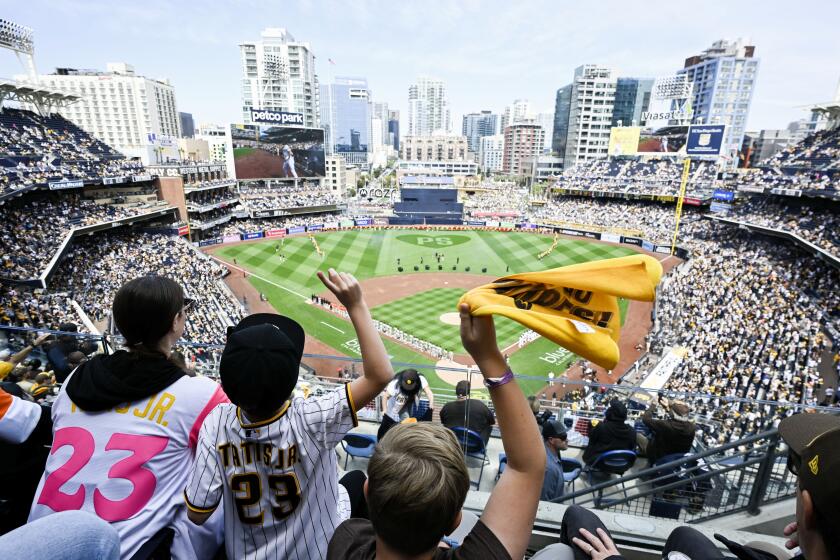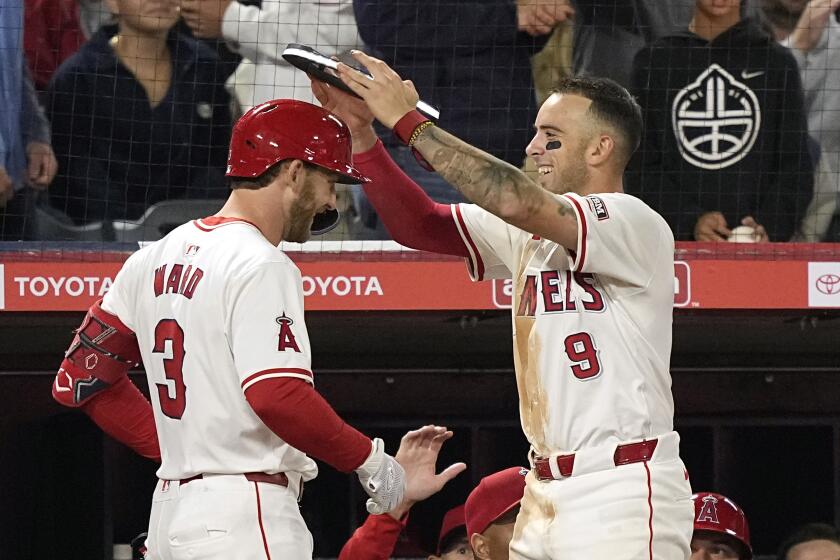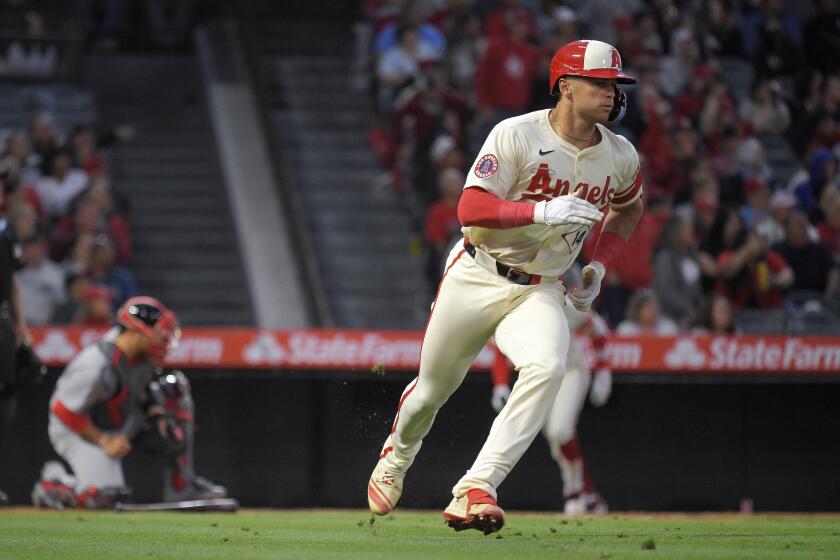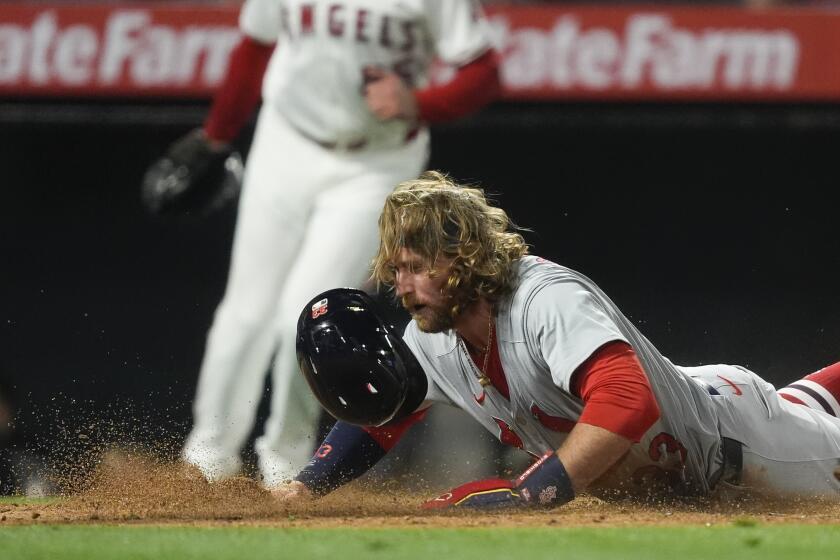Baseball has sold its soul
When it comes to truth in advertising, would our Great American Pastime be better described as our Great American Hustle?
Should baseball’s logo be a $3 bill?
For discussion, let’s use the case of relief pitcher Francisco Rodriguez.
Frankie set a major league record last season by saving 62 games. That meant that slightly more than six of every 10 times the Angels walked off the field as winners, in a regular season in which they won more than any other team, they did so after Frankie pointed to the sky.
He started working his way into the hearts of Angels fans as far back as the World Series championship season of 2002. That’s seven seasons to build camaraderie with the people who pay the bills.
Seven seasons of bonding.
It became very special last season. Most Angels games built like an orchestra’s grand finale, with sound and pace and drama growing, an inning-by-inning crescendo designed and destined to reach its peak with Frankie on the mound.
And once he got there, the real fun began.
There were the twitches, the wild look in his eyes, the wild pitches flying off his fingers. If the other team was already on fire when Frankie entered, he tended to add fuel. Throw a couple in the dirt. Walk the tying run to second.
If he started with the bases empty, he’d often fix that quickly. Maybe he was lonely.
There was seldom any of this Trevor Hoffman stuff. Fastball, grounder. Slider, grounder. Classic curveball, broken-bat dying duck to shortstop. One. Two. Three. Six minutes. Over and out.
Boring.
Frankie was never boring. He had his share of one-two-threes. But more often, he worked with men on base, his slider turning the catcher into a contortionist, and every person in the stadium leaning forward, unable to breathe.
When he entered a game, you could have run the outfield lights off the electricity emanating from the always-packed house. When he finished, people dragged themselves to the exits, drained and dripping.
Angels fans might have been the only ones in the history of the game to root for the other team to stay close. That way, Frankie’s appearance would qualify for a save and Manager Mike Scioscia would have to put him in.
In a 100-62 season, the Angels provided many reasons for fans to shell out hard-earned money and make the drive to Anaheim. Frankie certainly was among the biggest.
In seven seasons of this, fan infatuation grew. Dads and moms and Joeys and Joanies got attached to Frankie. There were autographed pictures on the kids’ bedroom walls and his-and-her No. 57 Angels jerseys for dad and mom.
Now, of course, Frankie is gone.
It became the real baseball season, November and December. Everything else was just window-dressing and jockeying for position for the money-grubbing, post-World-Series months.
Frankie will pitch for the New York Mets next season. He got a $37-million contract for three years, which was only a few million more than the Angels offered. In the category of excess, Frankie is a relative pauper to the $160-million-plus deals already tossed at several players, including the Angels at Mark Teixeira.
Good thing the country isn’t in any sort of economic downturn or these numbers would seem obscene.
This isn’t so much about grotesque paychecks for people playing a child’s game, or even about placing blame on Frankie or the Angels for splitting up so easily. Human nature can’t walk away from excessive financial windfalls, and baseball has certainly created that.
For a long time, there have been no illusions. Baseball has allowed itself to become less a league of teams and more a collection of traveling hired guns. Instead of calling its American League team the Yankees, New York should call it the Soldiers of Fortune. Players’ memorable moments used to come on the field. Now, they come with pen in hand.
It is time that we see the sales pitch for what it is.
Fan appreciation nights are phony image-building. Real appreciation would include honest efforts to retain star players and some semblance of team familiarity. Despite the expected prodding of agents, that honest effort can come from both team and player. Instead, it is hardly an afterthought.
Family fun nights? More soul-less marketing.
Keep a barf bag near your TV set for the next time you hear a player invoking the virtues of team effort or unity. Same thing for the owner or general manager. Consider it little more than nice lip service between contract talks.
It is acceptable for baseball to be no different than Citibank or Countrywide Bank or General Motors, until it tries to sell itself as the Red Cross. When we hear, sometimes in the same sentence, the terms “fan friendly” and “$90 for a spring training ticket,” we need to know that the carnival barker already has his hand in our pocket.
Frankie is gone and he’s not coming back. If his parting, like so many other players around the majors, was sweet sorrow, then it was also quick and efficient on both sides. Let’s rinse off our hands, clean the next fish and worry about the bones and the stink later.
It is two months until pitchers and catchers report to spring training, which is also a fraud, but one we have embraced for decades.
Spring training will be followed by the regular season, and another go-around at the old ball yard for dad and mom and Joey and Joanie, who will be told that the new hired guns mean an even better team.
Oh, and by the way, ticket prices have been raised.
--
More to Read
Go beyond the scoreboard
Get the latest on L.A.'s teams in the daily Sports Report newsletter.
You may occasionally receive promotional content from the Los Angeles Times.





